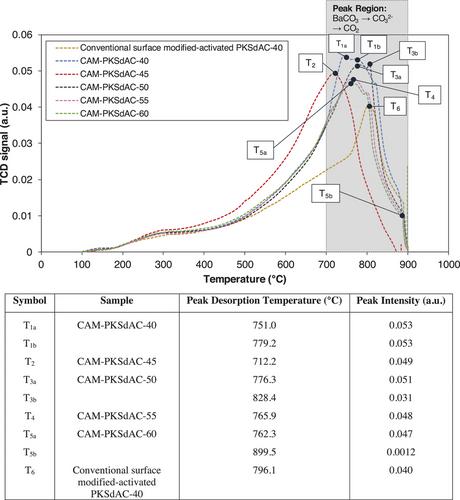下载PDF
{"title":"Post-combustion carbon dioxide adsorption of concurrent activated and surface modified palm kernel shell-derived activated carbon","authors":"Jia Yen Lai, Lock Hei Ngu","doi":"10.1002/ghg.2274","DOIUrl":null,"url":null,"abstract":"<p>This research applied a concurrent activation and surface modification (CAM) process to synthesize palm kernel shell-derived activated carbon (PKSdAC) to obtain CO<sub>2</sub> affinity surface functionalization. The CAM process is a simplified activated carbon activation process that is cost-effective. The CAM process used in this study integrates sulphuric acid activation and barium chloride functionalization. The formation of barium sulphate is targeted to incorporate barium through a reduction process with carbon-containing material at elevated temperatures into PKSdAC to obtain basic metal surfaces functional group for chemical adsorption. The optimal temperature for CAM-PKSdAC CO<sub>2</sub> adsorption performance was at 40–60 °C, established through temperature-programmed desorption of CO<sub>2</sub> (TPD-CO<sub>2</sub>) analysis. The CAM-PKSdAC adsorption performance was tested using a lab-scale adsorption system. The bed CO<sub>2</sub> content was determined using gas chromatography coupled with a thermal conductivity detector (GC-TCD) by manual syringe injection. CAM-PKSdAC exhibited a high CO<sub>2</sub> adsorption capacity of 0.89 mmol g<sup>−1</sup> from TPD-CO<sub>2</sub>, and 1.91 mmol g<sup>−1</sup> from GC-TCD at 40 °C and 1 bar. It showed comparable CO<sub>2</sub> adsorption capacity to conventional surface modified-activated PKSdAC (1.96 mmol g<sup>−1</sup>) while higher than commercial and modified ACs (1.14–1.60 mmol g<sup>−1</sup>), but lower than potassium hydroxide modified ACs (1.81–2.10 mmol g<sup>−1</sup>) at 40 °C and 1 bar. Barium promoted chemisorption of CO<sub>2</sub> as supplementary reaction, which increases adsorption capacity. The non-linear Dubinin Radushkevich model strongly correlates with the experimental adsorption data for CAM-PKSdAC adsorption, indicating the physisorption process via micropore filling on CAM-PKSdAC. CAM-PKSdAC showed moderate reusability with negligible variation in adsorption capacity after 10 adsorption–desorption cycles. © 2024 Society of Chemical Industry and John Wiley & Sons, Ltd.</p>","PeriodicalId":12796,"journal":{"name":"Greenhouse Gases: Science and Technology","volume":"14 3","pages":"492-525"},"PeriodicalIF":2.8000,"publicationDate":"2024-04-21","publicationTypes":"Journal Article","fieldsOfStudy":null,"isOpenAccess":false,"openAccessPdf":"https://onlinelibrary.wiley.com/doi/epdf/10.1002/ghg.2274","citationCount":"0","resultStr":null,"platform":"Semanticscholar","paperid":null,"PeriodicalName":"Greenhouse Gases: Science and Technology","FirstCategoryId":"93","ListUrlMain":"https://scijournals.onlinelibrary.wiley.com/doi/10.1002/ghg.2274","RegionNum":4,"RegionCategory":"环境科学与生态学","ArticlePicture":[],"TitleCN":null,"AbstractTextCN":null,"PMCID":null,"EPubDate":"","PubModel":"","JCR":"Q3","JCRName":"ENERGY & FUELS","Score":null,"Total":0}
引用次数: 0
引用
批量引用
Abstract
This research applied a concurrent activation and surface modification (CAM) process to synthesize palm kernel shell-derived activated carbon (PKSdAC) to obtain CO2 affinity surface functionalization. The CAM process is a simplified activated carbon activation process that is cost-effective. The CAM process used in this study integrates sulphuric acid activation and barium chloride functionalization. The formation of barium sulphate is targeted to incorporate barium through a reduction process with carbon-containing material at elevated temperatures into PKSdAC to obtain basic metal surfaces functional group for chemical adsorption. The optimal temperature for CAM-PKSdAC CO2 adsorption performance was at 40–60 °C, established through temperature-programmed desorption of CO2 (TPD-CO2 ) analysis. The CAM-PKSdAC adsorption performance was tested using a lab-scale adsorption system. The bed CO2 content was determined using gas chromatography coupled with a thermal conductivity detector (GC-TCD) by manual syringe injection. CAM-PKSdAC exhibited a high CO2 adsorption capacity of 0.89 mmol g−1 from TPD-CO2 , and 1.91 mmol g−1 from GC-TCD at 40 °C and 1 bar. It showed comparable CO2 adsorption capacity to conventional surface modified-activated PKSdAC (1.96 mmol g−1 ) while higher than commercial and modified ACs (1.14–1.60 mmol g−1 ), but lower than potassium hydroxide modified ACs (1.81–2.10 mmol g−1 ) at 40 °C and 1 bar. Barium promoted chemisorption of CO2 as supplementary reaction, which increases adsorption capacity. The non-linear Dubinin Radushkevich model strongly correlates with the experimental adsorption data for CAM-PKSdAC adsorption, indicating the physisorption process via micropore filling on CAM-PKSdAC. CAM-PKSdAC showed moderate reusability with negligible variation in adsorption capacity after 10 adsorption–desorption cycles. © 2024 Society of Chemical Industry and John Wiley & Sons, Ltd.
同时活性炭和表面改性棕榈仁壳衍生活性炭的燃烧后二氧化碳吸附作用
本研究采用同步活化和表面改性(CAM)工艺合成棕榈仁壳衍生活性炭(PKSdAC),以获得二氧化碳亲和表面功能化。CAM 工艺是一种具有成本效益的简化活性炭活化工艺。本研究采用的 CAM 工艺综合了硫酸活化和氯化钡功能化。硫酸钡的形成旨在通过含碳材料在高温下的还原过程将钡纳入 PKSdAC,从而获得基本金属表面官能团,用于化学吸附。通过对二氧化碳的温度编程解吸(TPD-CO2)分析,确定了 CAM-PKSdAC 二氧化碳吸附性能的最佳温度为 40-60 °C。使用实验室规模的吸附系统测试了 CAM-PKSdAC 的吸附性能。通过手动注射器注射,使用气相色谱法和热导检测器(GC-TCD)测定了床层中的二氧化碳含量。在 40 °C 和 1 bar 的条件下,CAM-PKSdAC 的二氧化碳吸附能力很高,TPD-CO2 值为 0.89 mmol g-1,GC-TCD 值为 1.91 mmol g-1。在 40 °C 和 1 bar 条件下,它的二氧化碳吸附能力与传统的表面改性活化 PKSdAC(1.96 mmol g-1)相当,高于商用和改性 AC(1.14-1.60 mmol g-1),但低于氢氧化钾改性 AC(1.81-2.10 mmol g-1)。钡作为补充反应促进了二氧化碳的化学吸附,从而提高了吸附容量。杜宾-拉杜什凯维奇非线性模型与 CAM-PKSdAC 吸附实验数据密切相关,表明 CAM-PKSdAC 上存在通过微孔填充的物理吸附过程。经过 10 次吸附-解吸循环后,CAM-PKSdAC 显示出适度的可重复使用性,吸附容量的变化可以忽略不计。© 2024 化学工业协会和 John Wiley & Sons, Ltd. 保留所有权利。
本文章由计算机程序翻译,如有差异,请以英文原文为准。



 求助内容:
求助内容: 应助结果提醒方式:
应助结果提醒方式:


